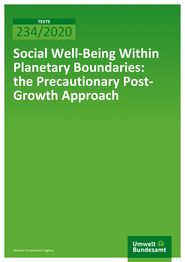Landmark report: Social well-being within planetary boundaries by reducing dependence on economic growth
After it has triggered significant debate in Germany, the report on the precautionary post-growth approach is now published in English language. With it, the researchers are seeking a new consensus in the sustainability debate at a crucial time when billions are being poured into economic stimulus programs.
The global environmental and climate crises call for systemic societal change. Strategies like the European Green New Deal and the recent Corona-related economic stimulus packages are trying to respond to the enormous challenges. German economists argue in a study that there is a growing need to rethink the dependence on economic growth, because all too often ambitious environmental policies are not enacted due to the fact that they are seen to ‘interfere’ with economic growth. The researchers’ core recommendation is: If an economy became less dependent on growth, this would open up new opportunities not only for environmental policy, but also for many other policy areas.
After it has triggered significant debate in Germany, the landmark report ‘Social well-being within planetary boundaries: The precautionary post-growth approach’ has now been published in English language. It was authored by researchers from the Institute for Ecological Economy Research (IÖW), RWI – Leibniz Institute for Economic Research and the Wuppertal Institute for Environment, Climate, Energy on behalf of the Federal Environment Agency (UBA).
Beyond the dichotomy of green growth versus degrowth
“On the subject of economic growth so little is moving, as the policy recommendations of the two prominent positions within the discourse are fully contradictory: green growth and degrowth”, explains lead author Ulrich Petschow from the IÖW. “Our analysis shows that both positions are based on core assumptions that cannot be adequately substantiated scientifically and thus cannot claim to serve as the sole strategy for environmental policy action.”
Precautionary post-growth – new consensus in the sustainability debate?
The researchers therefore propose a third position and put it up for discussion with this report: precautionary post-growth. “From our point of view, this approach has the potential to create a new consensus in the sustainability debate which is particularly crucial at a time when billions are being channelled into economic recovery programs” says sustainability transitions researcher Florian Kern, head of the research group Ecological Economics and Environmental Policy at IÖW. “We would like to stimulate new research, new policy recommendations and a wider societal discussion on how to become less dependent on economic growth and increase the resilience and sustainability of societies.”
The report discusses the possibility that economic systems can be shaped by various reform proposals in such a way that they would be less dependent on economic growth. The authors outline the core elements of their proposal for such a precautionary post-growth approach. The report has been produced within the project ‘Approaches to Resource Conservation in the Context of Post-Growth Concepts’ which was funded by the German Federal Environment Agency (UBA).
++++++++++++++++
Bibliographic information and download:
Petschow, Ulrich; aus dem Moore, Nils; Pissarskoi, Eugen; Korfhage, Thorben; Lange, Steffen; Schoofs, Annekathrin; Hofmann, David; with contributions from Hermann Ott (2020): Social Well-Being Within Planetary Boundaries: the Precautionary Post-Growth Approach, UBA-Texte 234/2020, 180 pages, Download PDF (2 MB)



